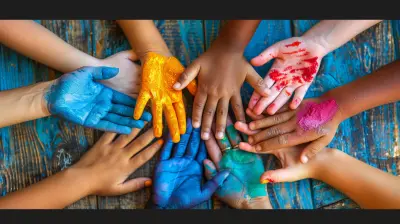30 May 2025
The first day of school can be nerve-wracking for both students and teachers. The classroom is filled with unfamiliar faces, and the silence can be awkward. But what if we could break the ice with fun and engaging activities? That’s where creative icebreaker games come in!
These games help students feel comfortable, encourage interaction, and set a friendly tone for the rest of the school year. So, if you want to make the first day unforgettable, keep reading for some exciting icebreakers that will turn strangers into friends in no time. 
Why Icebreaker Games Matter
Before we jump into the games, let’s talk about why they matter. Imagine walking into a room full of strangers—you’d probably feel a little anxious, right? That’s exactly how students feel on the first day of school. Icebreakers help by:- Easing Nervousness: They help students relax and get comfortable in a new environment.
- Building Connections: When students interact in a fun way, they find common interests and start forming friendships.
- Encouraging Participation: A welcoming atmosphere makes students more willing to engage in class discussions from the start.
- Boosting Confidence: Icebreakers give shy students a chance to open up without feeling pressured. 
Fun and Engaging Icebreaker Games
Now that we know why icebreakers are important, let’s dive into some creative ones that will make your classroom feel like a second home.1. Two Truths and a Lie
How to Play:Each student takes turns sharing three statements about themselves—two that are true and one that’s a lie. The rest of the class tries to guess which statement is false.
Why It Works:
This game sparks curiosity and laughter, making it a great way for students to get to know each other in a fun, low-pressure way.
2. Find Someone Who…
How to Play:Give each student a bingo-style sheet with different characteristics (e.g., “Find someone who has a pet cat,” or “Find someone who can speak another language”). Students walk around the room and find classmates who fit the descriptions.
Why It Works:
It encourages movement, conversation, and quick connections between students who might not otherwise talk to each other.
3. M&M Game
How to Play:Pass around a bag of M&Ms and ask students to take a few (without telling them why). After everyone has their candies, assign a question to each M&M color (e.g., red = favorite hobby, blue = dream job). Students answer based on the colors they took.
Why It Works:
It adds an element of surprise, allowing students to open up in a relaxed way while enjoying a sweet treat!
4. Would You Rather…?
How to Play:Prepare a list of “Would You Rather” questions (e.g., “Would you rather have the ability to fly or be invisible?”). Students take turns choosing one option and explaining why.
Why It Works:
This game sparks interesting discussions and lets students express their personalities in a lighthearted way.
5. The Name Game
How to Play:Students introduce themselves using an adjective that starts with the same letter as their first name (e.g., "Silly Sarah" or "Jolly Jake"). Each student repeats the names before them, adding their own.
Why It Works:
It helps with name memorization while keeping the atmosphere fun and engaging.
6. Classroom Scavenger Hunt
How to Play:Create a list of items or facts students must find around the classroom (e.g., “Find a book written by an author with the letter ‘J’ in their name” or “Find a classmate who has the same favorite color as you”).
Why It Works:
It gets students moving and interacting while becoming familiar with their new learning environment.
7. Human Knot
How to Play:Students stand in a circle, reach across, and grab two different hands. Without letting go, they must untangle themselves to form a complete circle.
Why It Works:
This game promotes teamwork, communication, and problem-solving skills—all while having a blast!
8. Back-to-Back Drawing
How to Play:Pair up students and give one a simple drawing. The other has to recreate it based on verbal instructions—without seeing it!
Why It Works:
It enhances listening skills, encourages teamwork, and results in lots of laughter.
9. Emoji Introductions
How to Play:Ask students to describe themselves using only three emojis. Then, have them explain their choices to the class.
Why It Works:
It’s a fun and modern way to let students express themselves without the pressure of a long introduction.
10. Beach Ball Questions
How to Play:Write different questions all over a beach ball. Toss it around the room, and when a student catches it, they answer the question that their hand lands on.
Why It Works:
It keeps things dynamic and allows for spontaneous, lighthearted introductions. 
Tips for a Successful Icebreaker Session
- Break the Ice Yourself: If you’re leading the games, set the example! Show enthusiasm and participate in the activities to encourage students to do the same.- Mix It Up: Use a combination of movement-based and sitting activities so all students feel comfortable.
- Encourage Inclusivity: Make sure every student gets a chance to participate and feel included.
- Keep It Light: The goal is to have fun and build connections, so avoid games that put students on the spot or make them feel exposed.
- Follow Up: After the icebreaker session, reference things students have shared to build deeper connections throughout the year.

Wrapping It Up
The first day of school sets the tone for the entire year. By incorporating creative and engaging icebreaker games, you’re not just breaking the ice—you’re building a strong foundation for a positive classroom environment.So, why settle for awkward silences when you can turn introductions into a memorable experience? Try out these activities, watch the laughter spread, and enjoy the magic of a connected classroom!









Rex Tucker
Kick off the school year with fun and creativity! These icebreaker games will not only energize your classroom but also build connections among students. Let's make the first day memorable and foster a positive learning environment together!
December 24, 2025 at 3:57 AM